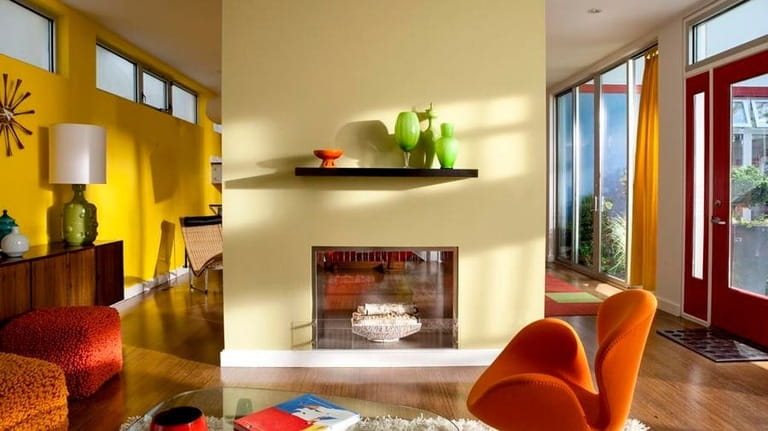Have you ever wandered from room to room in your own house and felt like something just wasn't working? Maybe the living room feels cozy, but stepping into the kitchen feels like you've entered a completely different home.
I've been there—it's frustrating when your house doesn't quite flow the way you want it to. The good news? You're not alone, and the solution might be easier than you think.
In this article, we're going to uncover some of the hidden reasons why your home might not feel as harmonious as you'd like—and most importantly, how you can fix it.
1. Inconsistent color scheme

Create a consistent color palette
If you don't have a consistent color palette throughout your home, rooms might feel disconnected, making the whole house seem a bit off. This is easy to notice in open spaces. However, sudden color changes behind closed doors can be just as jarring in a house with separate rooms.
To create a consistent color palette, try using the classic 60-30-10 rule. This means that the dominant color covers around 60% of the space while the secondary color occupies 30% and the remaining 10% is an accent color.
2. Use of contrast materials

Pair contrast materials in a lower-contrast level
Source
Combining contrast materials, such as wood (rustic, warm-toned) and metal (sleek, cool-toned), can be tricky. If not carefully balanced, these elements can clash and disrupt the harmony of your space.
However, with a lower contrast, contrast materials can complement each other beautifully. Instead of pairing highly contrasting colors like black and white, try pairing tones that are closer together such as dark woods and warm metals like brass and copper.
3. Chaotic mix of styles.

Follow the 80/20 rule to seamlessly blend modern and traditional styles.
Source
There are many home decor styles and each of them has their own unique design philosophies and aesthetics. When mixing different styles—like pairing sleek, contemporary kitchen cabinets with a vintage, farmhouse-style appliances—it's easy to create a jarring contrast that feels chaotic and mismatched.
But don't worry! You can make them work together beautifully by using the 80/20 rule. Simply choose one style to dominate 80% of your space, and let another style shine in the remaining 20%.
4. Too much clutter

Minimize visual clutter
Source
Having too much clutter can really mess up the visual flow and balance of your space, making it look a bit chaotic.
To keep things looking neat and cohesive, try to minimize visual clutter at home. You can do this by removing any unnecessary furniture pieces, tucking away appliances you don't use daily, or leaving some walls empty.
5. You have no inspiration piece
The artwork above bed served as an inspiration piece
When redecorating, it can be tricky to make your home decor flow nicely without a starting point - inspiration piece.
First, pick one decor item that you absolutely love. Check out its style, colors, and texture. Then, choose other items that complement or match it. This way, everything will come together beautifully!
6. Too many patterns

Use no more than 3 patterns in a space
Source
Using too many patterns like floral prints, stripes, and geometric designs in a room can make it feel a bit chaotic and cluttered.
To keep things looking cohesive and balanced, try sticking to just three patterns. This way, you get a nice variety and visual interest without overwhelming the space. It's best if these patterns share some common elements, like a similar color scheme or shapes, to tie everything together smoothly.
7. Improper use of scale and proportion
Choose furniture that fits the room's scale
When furniture or decor items are either too big or too small for a room, it can mess up the balance and harmony of the space.
Thus, before making a purchase, you have to take accurate measurements of your room and furniture. This ensures that the scale and proportion of each piece harmonize with the room's dimensions.
8. Lack of repetition
Repeated patterns enhance cohesion in a room
Source
If your home decor is a mix of styles, colors, and materials, it can sometimes feel fragmented.
To bring everything together, try using repetition. By repeating elements like colors, patterns, textures, or shapes, you create a sense of harmony and flow.
9. Improper lighting

Layer lighting for even lighting effect
Without combining lighting sources together well, the overall lighting effect will be uneven, disrupting the flow and harmony of your home decor.
Thus, each room should have multiple sources of light to distribute light evenly without feeling too bright or too dim compared to others.
10. Ignoring personal touch

Display meaningful arts
Adding random furniture or decorative items might look nice on their own, but without your personal touch, they do not create a cohesive look.
Instead, try incorporating items that have sentimental value or tell your story. This way, you can connect each room in your home. Think about using family heirlooms, DIY projects, or souvenirs from your travels.












